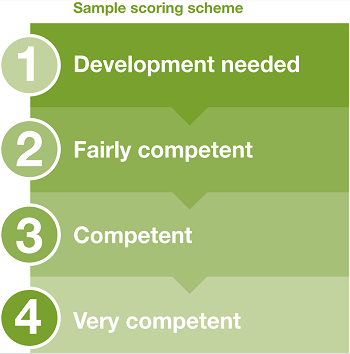Assessment Centres
As part of the recruitment process, organisations use assessment centres to evaluate job applicants’ suitability for a post, along with an interview.
Employers will often use this method of selection when they are recruiting from a large pool of applicants, such as newly qualified nurses, or in response to a recruitment campaign. Assessment centres are now being used more frequently for all recruitment.
What is an assessment centre?
An assessment centre consists of one or more activities to enable the selection panel to decide who best meets the requirements of the job. These centres look for:
Communication - Able to demonstrate knowledge clearly and concisely, does not interrupt others, listens attentively, demonstrates positive body language and good eye contact, contributes ideas, facilitates the contribution of others.
Adaptability - Demonstrates leadership potential, enthusiasm and determination along with the ability to deal with new situations and resolve problems with confidence.
Clinical understanding - Able to prioritise and identify appropriate clinical actions and demonstrate knowledge of theory, able to be factually accurate.
What to expect
An assessment centre can last for up to four hours, with breaks between activities. You may meet the other candidates and undertake joint activities with them, although some centres will focus more on individual exercises. An assessment centre may be used as an initial screening exercise, prior to progression to interview. Or you may need to pass a certain element, such as a numeracy test, before you can progress further.
Tests of numeracy and literacy skills
Numeracy tests often include drug calculations. Literacy tests may include a written comprehension of a text, where candidates are tested on their ability to understand and summarise information and write clearly. For more information on numeracy skills, see here.
Written scenarios/case study exercises
These often test clinical competences and nursing knowledge. For example, you may be given a clinical scenario and a series of questions to answer, or a care planning exercise.
Objective Structured Clinical Examination (OSCE)
This is an assessment of clinical competence, where components of the competence are tested individually. Often simulation techniques are used with mannequins. For example, you may be asked to demonstrate how you would safely assess and manage a patient presenting with a specific problem. For more information on OSCEs, see here.
Presentations
You may be asked to present on a topic, either sent in advance of the assessment date or given on the day, with time allowed to prepare the presentation beforehand. (If you need advice about presentations, see our page on presentation skills.)
Group discussion about a topic
You may be given a topic to discuss, or a problem to solve. Often employers are testing communication skills, checking that you interact well with others, listen to them and contribute, to the task.
Success depends on contributing enough, without dominating and interrupting the discussion.
It is helpful to stay positive throughout and to reflect on what has been discussed periodically.
Consider your body language and both verbal and non verbal cues (e.g. nodding, smiling) as you interact with other group members.
Role-play exercises
You may be asked to work with other candidates to show how you would respond to a professional scenario. Sometimes actors or one of the assessors will play the role of a patient or client.
You will usually be provided with briefing information and preparation time and you should behave as you normally would in your nursing role.
Psychometric tests
Psychometric tests are structured assessment methods. They may include aptitude or ability tests, personality questionnaires, or a combination of both.
Employers may be keen to look for certain values or attitudes which are necessary for providing compassionate, dignified care.

Scoring schemes
You will usually be rated on your performance in each of the component sections of the assessment.
Employers will select the candidate(s) with the two highest overall score(s). Some tests may have a right or wrong answer.
In other tests, employers will mark against a scale according to specific criteria.
Assessment Centre Tips
Before you go
- If you have a disability that may affect your performance in any activities, let the employer know beforehand to discuss reasonable adjustments.
- Plan your outfit in advance and make sure you look clean, smart and professional.
- Make sure you plan your journey and how long it will take, allowing for delays. If your assessment is taking place on a large hospital site for example, allow yourself extra time to find the precise location.
- Get plenty of rest the day before as it will be quite tiring.
- Never underestimate the importance of eating proper meals. Skipping breakfast or lunch can force your body into "fight or flight," mode, and raise your cortisol/stress levels. This in turn can exacerbate nerves or make it more likely to get brain freeze or mind blocks.
On the day
- Assume that you are being assessed at all times. This even includes when you're waiting in reception, or saying goodbye to a member of the hiring panel at the end of the day.
- You will be assessed against the criteria outlined in the job description and person specification, so it is important that you know these documents well.
- Read the guidance notes carefully. Take your own stationery just in case.
- Visit the employer’s website so you know as much about the organisation as possible. In particular pay to any organisational or company values they might have. It's more than likely that they will be looking for evidence of these values, qualities or strengths during the assessment.
- Reflect on your own style and its impact on potential group activities. If you are naturally very talkative, remind yourself that you may need to focus more on listening. If you are very quiet, remember that you will need to speak up to make an impact on the assessors.
- Reflect on your “best self”. Think of a time when you have worked really well in a team or when your contribution was valued by colleagues or patients. Think about the skills you used in that situation and the behaviours you displayed.

Nurses and Midwives
Resources for nurses and midwives: improve your employability or explore options and ideas if you're at a career crossroads.

Nursing Support Workers
Career resources for Healthcare Assistants, Assistant Practitioners, Nursing Associates and Support Workers.

Students: Your Career
Resources to help you write your first nursing CV or job application, and tips on how to stand out at interview.





